The ARM vs x86 Wars Have Begun: In-Depth Power Analysis of Atom, Krait & Cortex A15
by Anand Lal Shimpi on January 4, 2013 7:32 AM EST- Posted in
- Tablets
- Intel
- Samsung
- Arm
- Cortex A15
- Smartphones
- Mobile
- SoCs
SunSpider 0.9.1
The results get more interesting when we look at power consumption during active workloads. We'll start off with SunSpider, a mid-length JavaScript benchmark that we frequently use in our reviews:
At the platform level, Qualcomm's APQ8060 powered Dell XPS 10 falls in between Surface RT and Acer's W510. Active power looks very similar to the Intel powered W510, but performance is appreciably slower so total energy consumed is higher.
Looking at the CPU, the situation changes a bit. Intel's peak power consumption is similar to Tegra 3, while Krait manages to come in appreciably lower. I suspect that missing the L2 cache power island here is lowering Qualcomm's power consumption by 100 - 200mW but overall CPU-only power consumption would still be lower. Once again, at idle Krait seems to have a bit of an advantage as well.
The situation changes once we look at GPU power consumption, with Intel/Imagination having the clear advantage here.
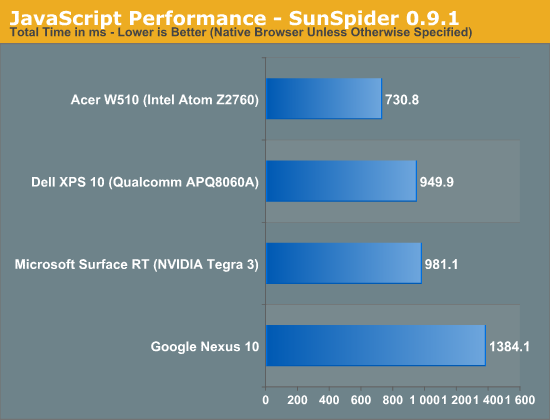
Kraken
Mozilla's Kraken benchmark is a new addition to our js performance suite, and it's a beast. The test runs for much longer than SunSpider, but largely tells a similar story:
At the platform level, Acer's W510 has slightly higher peak power consumption compared to the Dell XPS 10 but it also completes the test quicker, giving it a better overall energy usage profile.
Looking at the CPU cores themselves, Qualcomm holds onto its lead here although once again, I suspect the margin of victory is exaggerated by the fact that we're not taking into account L2 power consumption for Qualcomm. Intel does deliver better performance, which allows the CPU to race to sleep quicker than on APQ8060A.
The comparison to Tegra 3 is not surprising, this is exactly what we've seen play out in our battery life tests as well.
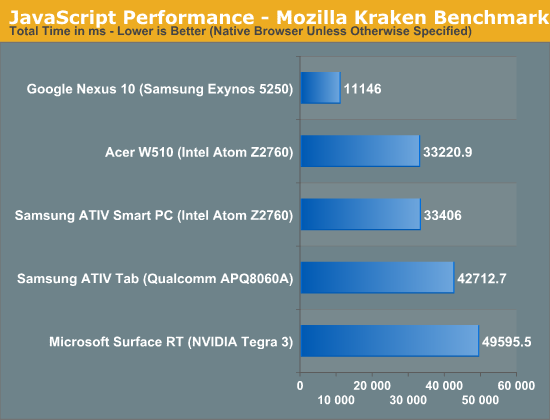
RIABench
RIABench's Focus Tests are on the other end of the spectrum, and take a matter of seconds to complete. What we get in turn is a more granular look at power consumption:
Here the W510 consumes more power at the platform level, but drops to a lower idle state than the XPS 10. Surface RT clearly uses more power than both.
Krait's CPU level (excluding L2 cache) power consumption is once again lower than Atom's, but Atom completes the task quicker. In this case total energy usage is still in Qualcomm's favor. The fact that there's a discrepancy between CPU specific power results and the total platform results are partly due to the missing L2 cache power consumption data from the CPU power chart for Qualcomm, and partly due to differences in the tablets themselves.
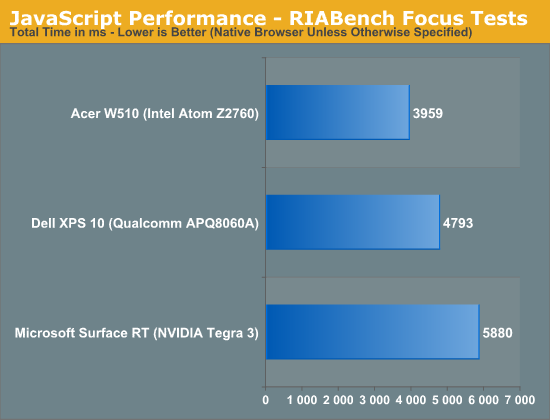


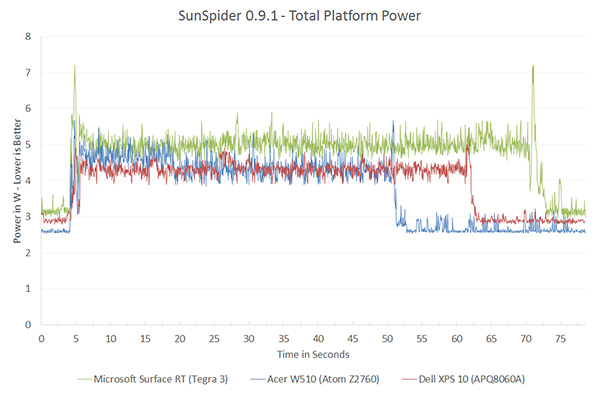
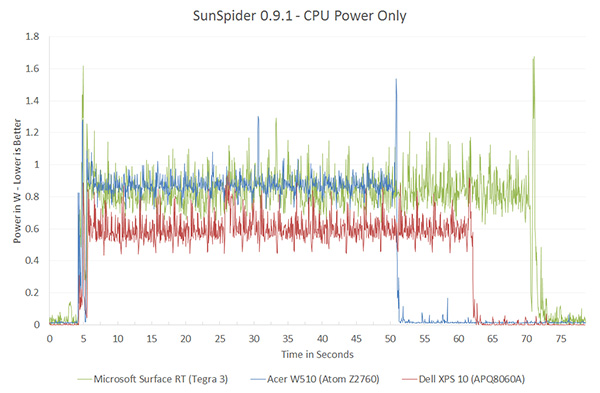
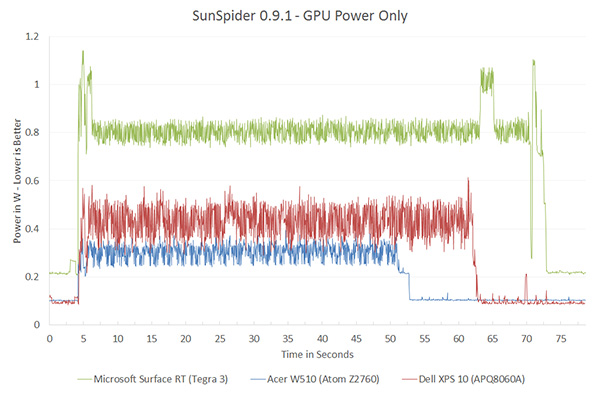
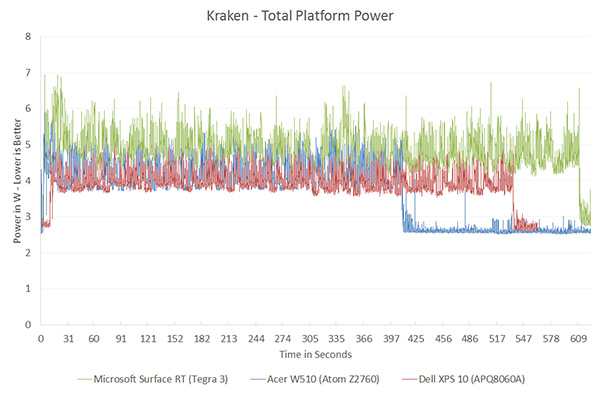
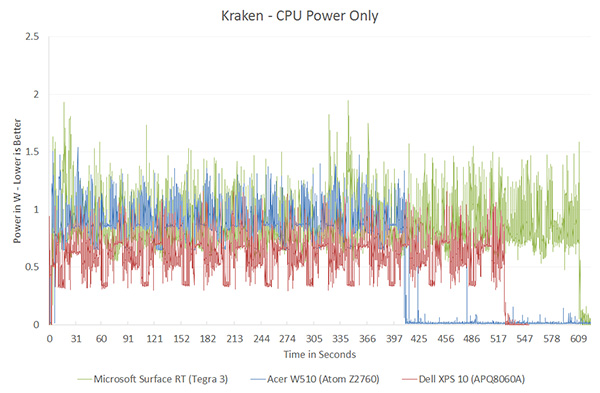
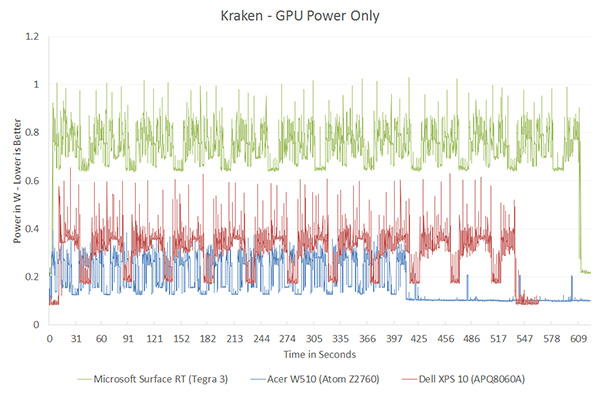
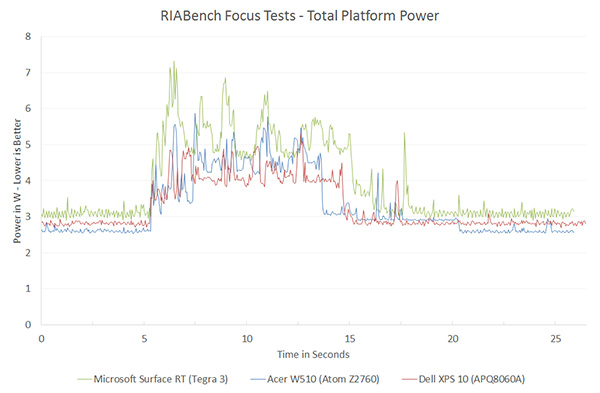
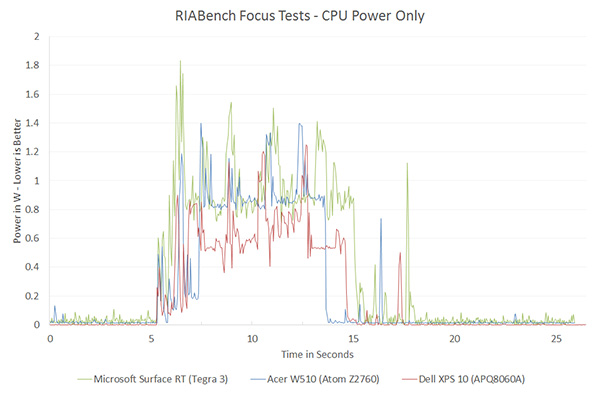
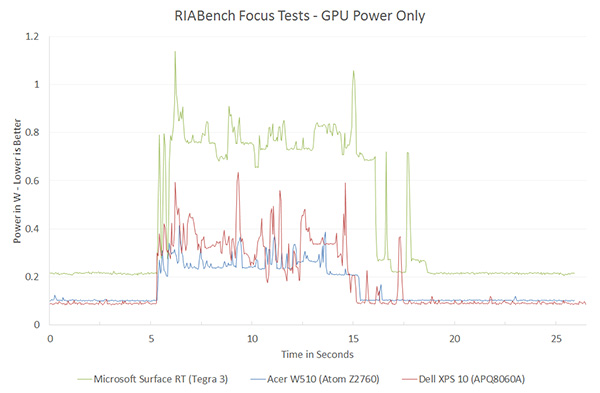








140 Comments
View All Comments
djgandy - Friday, January 4, 2013 - link
People care about battery life though. If you can run faster and go idle lower you can save more power.The next few years will be interesting and once everyone is on the same process, there will be less variables to find to assert who has the most efficient SOC.
DesktopMan - Friday, January 4, 2013 - link
"and once everyone is on the same process"Intel will keep their fabs so unless everybody else suddenly start using theirs it doesn't look like this will ever happen. Even at the same transistor size there are large differences between fab methods.
jemima puddle-duck - Friday, January 4, 2013 - link
Everyone cares about battery life, but it would take orders of magnitudes of improvement for people to actually go out of their way and demand it.Wolfpup - Friday, January 4, 2013 - link
No it wouldn't. People want new devices all the time with far less.And Atom swaps in for ARM pretty easily on Android, and is actually a huge selling point on the Windows side, given it can just plain do a lot more than ARM.
DesktopMan - Friday, January 4, 2013 - link
The same power tests during hardware based video playback would also be very useful. I'm disappointed in the playback time I get on the Nexus 10, and I'm not sure if I should blame the display, the SOC, or both.djgandy - Friday, January 4, 2013 - link
It's probably the display. Video decode usually shuts most things off except the video decoder. Anand has already done Video decode analysis in other articles.jwcalla - Friday, January 4, 2013 - link
You can check your battery usage meter to verify, but... in typical usage, the display takes up by far the largest swath of power. And in standby, it's the wi-fi and cell radios hitting the battery the most.So SoC power efficiency is important, but the SoC is rarely the top offender.
Drazick - Friday, January 4, 2013 - link
Why don't you keep it updated?iwod - Friday, January 4, 2013 - link
I dont think no one, or no anandtech reader with some technical knowledge in its mind, has ever doubt what Intel is able to come up with. A low power, similar performance or even better SoC in both aspect. Give it time Intel will get there. I dont think anyone should disagree with that.But i dont think that is Intel's problem at all. It is how they are going to sell this chip when Apple and Samsung are making one themselves for less then $20. Samsung owns nearly majority of the Android Market, Which means there is zero chance they are using a Intel SoC since they design AND manufacture the chip all by themselves. And when Samsung owns the top end of the market, the lower end are being filled by EVEN cheaper ARM SoCs.
So while Intel may have the best SoC 5 years down the road, I just dont see how they fit in in Smartphone Market. ( Tablet would be a different story and they should do alright.... )
jemima puddle-duck - Friday, January 4, 2013 - link
Exactly. Sometimes, whilst I enjoy reading these articles, it feels like the "How many angels can dance on the head of a pin" argument. Everyone knows Intel will come up with the fastest processor eventually. But why are we always told to wait for the next generation? It's just PR. Enjoyable PR, but PR none the less.